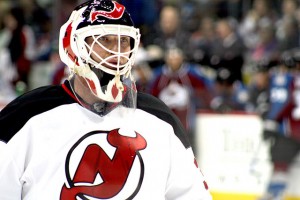With a résumé as amazing as Martin Brodeur’s one really has to stretch to find fault with the Blues signing the Hall-of-Famer. The deal is cheap against the cap too — $700k with various incentives — so at the very least the Blues have a high-profile backup that sells merchandise and puts butts in seats. Plus, he may just be what the team needs to put them over the top. Hard to find a flaw there, unless you’re a journalist with an agenda. Martin Brodeur is 42, and while that might seem ancient when you consider the average age of today’s NHLer, it’s less a factor when you consider a few things surrounding his career and his current expectations with the St. Louis Blues. With close to 700 wins, four Vezina Trophies and three Stanley Cups among other accolades, there’s only one reason for an external lack of confidence in bringing St. Louis a Cup — his age.
Brodeur never had a huge workload
Yes, Martin Brodeur had his share of long seasons, often playing in excess of 70 games. But that doesn’t tell the whole story. Throughout his career in the clutch-and-grab neutral zone trap heyday of the New Jersey Devils, it wasn’t uncommon to see Brodeur face around 18-25 shots per game. Even outlets that have little respect for Brodeur’s career acknowledge that a large reason for his success is his historically-low shots against. Given the fact that many of those were of the unthreatening variety considering the team’s stingy defense, Brodeur’s actual wear and tear is minimal, evidenced by the stunning paucity of injuries over such a long career. The longest stretch was about a three month period after an odd bicep injury in 2008 — well before goalies are considered “old.” Of course, depending on who you ask, 36 — Brodeur’s age at the time — was also grizzled. But when he came back, it seemed not much changed. Any goalie facing numerous quality chances is more likely to age quicker, although even oft-beleaguered guys like Curtis Joseph also played well into their 40s. Jacques Plante and Johnny Bower are also goalies from a bygone era that excelled into their 40s, not to mention Dominik Hasek, the ageless wonder.

The Blues don’t need to lean on Brodeur
The Blues have been one of the better defensive teams over the last few years, often drawing comparisons to those 90’s Devils squads. Plus, the presence of Jake Allen means that Marty won’t have to play 95 percent of the remaining games, unlike his younger days. The raw truth is, Brodeur never had a backup that could replace his consistency and win count, save for Scott Clemmensen’s heroics in 2008. Jake Allen, should the Blues remember what consistent smart play looks like in their defensive zone, is more than capable of handling at least 40 percent of the remaining games in the schedule, provided of course that Brian Elliott doesn’t return sooner than expected. The Blues’ system keeps prime scoring areas generally clear, forcing many plays to the outside and allowing goalies to smart positional hockey rather than performing gymnastics to keep the puck out of the net. As such, Brodeur’s wear and tear should be kept to a minimum.

Brodeur’s real strength is in the postseason
Martin Brodeur has three Stanley Cups to his name. The two Finals in which he lost featured Patrick Roy and Jonathan Quick at the other end; one a legend in his own right and the other a solid goalie on a team that refused to lose in 2012. That year, Brodeur was 40, leading an overachieving Devils team to within two wins in a Cup Final they had no business being in. This is the real key to the Blues bringing in Brodeur. For years, the team has struggled to get over the hump once playoff time came around. Even last year’s stacked team had problems getting out of the first round with Ryan Miller — although to be blunt, Miller isn’t Marty. The point is, Jake Allen could play 80 percent of the remaining regular season games before handing the puck to Brodeur in the postseason, because the untold reality is that is what the addition of Brodeur really centers around. With Marty’s evident motivation not only to play, but to win, the NHL and its cabal of orbiters might well find out Brodeur’s longevity is a badge of success alongside his individual and team accomplishments.
